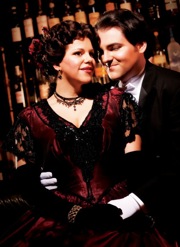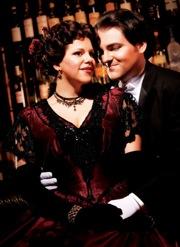Compared to Madama Butterfly and La Bohème, Puccini’s La rondine (The swallow), which premiered in 1917, is certainly a less-performed work, though it can hardly be called obscure.
In the past decade, the opera has been performed at the Royal Opera House, the Metropolitan Opera, and the San Francisco Opera, among other places, all with superstar Angela Gheorghiu starring as Magda. The Met production was also released in HD simulcasts in movie theaters around the globe. In the upcoming production at Opera San José, two sopranos will come home to roost for performances April 24–May 9: Rebecca Davis and Jasmina Halimic.

Davis was a member of OSJ’s resident company in 2008-2009, singing Tatyana in Eugene Onegin, Adina in The Elixir of Love, Fiordiligi in Così fan tutte, and Micaela in Carmen. Halimic is making her OSJ debut and was contracted for the role only a week before rehearsals began. Opera San José has a reputation for nurturing young singers, and that certainly was Halimic’s experience. “I was lucky to be here in this empathetic, encouraging, and positive environment where everyone was always ready to help me get this role off to a good start. [Music Director Dr. David] Rohrbaugh was especially supportive and even gave me extra time and hours to get my voice back on track after illness. It’s very important that singers feel comfortable and confident when the performance time comes, so the fact that we have a long rehearsal period is such luxury. It only tells me that Opera San José strives for the quality in performance.” She goes on to say, “Working with José Maria Condemi is a dream for any young singer. He is a brilliant director, and working with him feels like a master class in acting. We are all very excited about this project and can’t wait to share it with the public.”
Both singers see parallels between the passionate and self-sacrificing nature of this character and Violetta in Verdi’s La traviata, a courtesan torn between her love for a man of nobility and the potential harm her own status may bring him. Both singers also see a strong, sympathetic character in Magda. Davis says, “I think at some point of our lives we want something we don’t have. For Magda, she wanted true love, which was quite different from the relationship she is in at the beginning of the story. I think most everyone has been in a relationship that worked, but something was missing. It was important to me to find that true balance of love and a great partner. I’m lucky I found it. In Magda’s case, she finds her true love when she ventures out to Bullier’s nightclub. Unfortunately, she is not able to keep that love when she feels her sordid past makes her undeserving of being welcomed into a virtuous family.”
Comparing Magda to Puccini’s other heroines, Davis says that she thinks Magda is quite different. “Most of his other characters, like Butterfly and Mimi from La Bohème, are victims of circumstance, and they deal with what they get the best that they can. In Mimi’s case it’s illness, and with Butterfly, it’s war that brings her husband, Pinkerton, and then she has to deal with the fact that it was a marriage of convenience for him, while he was stationed in Japan. I really feel Magda is in control of her situation. She knows what she wants and she goes and gets it, and then when faced with a heart-wrenching decision to do something good for her partner, she decides to leave him and go back to her old life.”
Listen to the Music
Halimic also sees a woman who makes choices. “Magda is a woman who made the conscious decision to make the best of what life had offered her. She had a turbulent past as a courtesan, a past that negated every possibility of a future as a honest Christian woman devoted to a quiet family life. Due to such circumstances, she realized that her best option in life is to accept an offer to become the wife of an aging, wealthy banker, and although she clearly loves and respects him, she quietly longs for that passionate, romantic connection. She successfully adapts and conforms to the superficiality of the wealthy society lifestyle while she fights to suppress her desires.”
Halimic continues, saying, “There are moments in the opera where she lets the real self peek out for a moment, but manages to always keep it a mystery. In spite of the comfort of her current situation, she can no longer deny the deep longing she subconsciously seeks. She makes the final decision to follow her heart in order to fulfill this longing. I think most women can relate and at least empathize with Magda’s romantic dreams and desires.”
Those dreams and desires are expressed in the famous first-act waltz aria, “Chi il bel sogno di Doretta.” Halimic’s favorite moment in the opera comes in the final act when, for a time at least, those dreams are realized. “It’s complex, as there’s the underlying current of awareness that these idyllic moments are fleeting and that the reality will eventually shatter their dream. In spite of this awareness she clings to now, in these passionate moments she finally gets to live. I love singing the final duet. It breaks my heart every time, yet it’s so powerful emotionally, it almost feels a little masochistic.”
For Davis, the moment comes earlier: “I love drama, so my favorite part is at the end of Act 2, when Magda tells Rambaldo (her sugar-daddy) that she has fallen in love and she is leaving him. It’s very emotional for her because she is taking a huge risk leaving him for someone she has just met. The music really lends itself to the drama.”
Magda’s love interest, Ruggero, will be sung alternately by former OSJ resident artist Christopher Bengochea and current resident artist Alexander Boyer. If you’d like to know more about the opera before you see it, preperformance talks are given at 6:30 p.m. before evening performances (excluding opening night) and at 1:30 p.m. before matinees. Maestro David Rohrbaugh will conduct.

